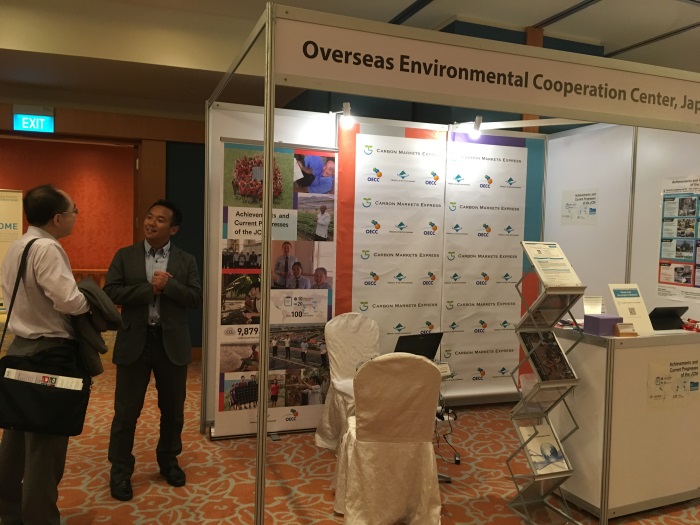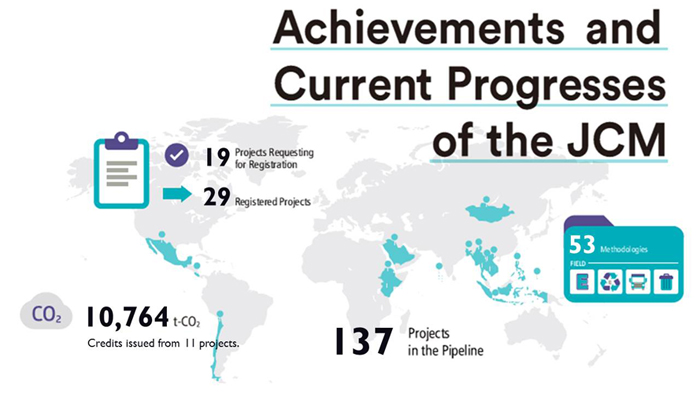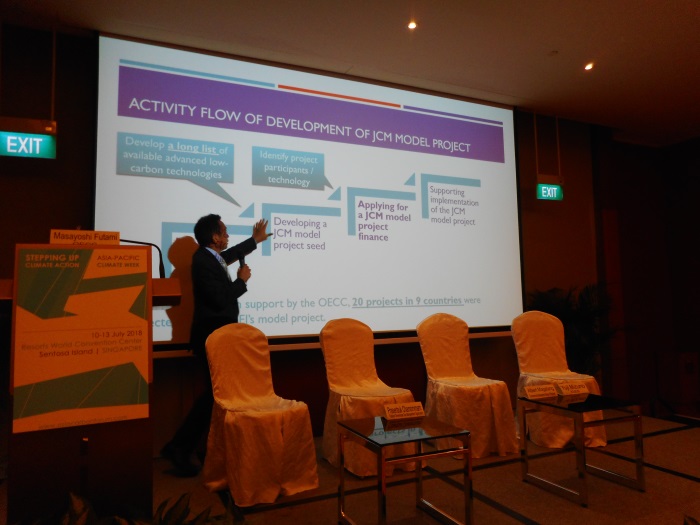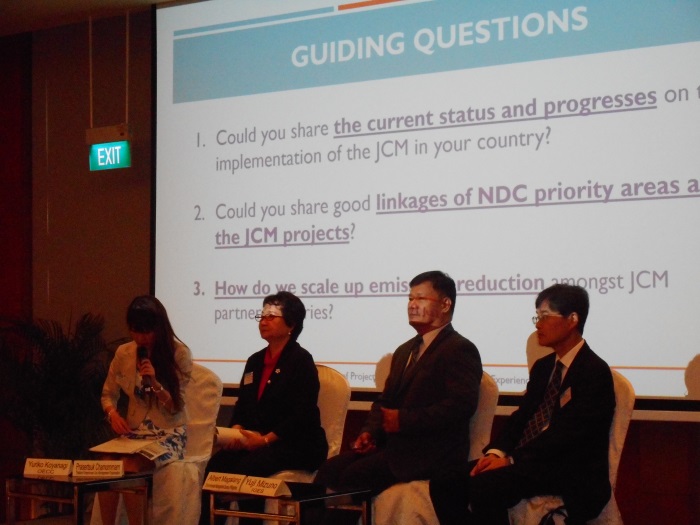APCF 2018:Booth Exhibition and Side Event
Asia Pacific Carbon Forum 2018 in Sentosa, Singapore
Booth Exhibition
The Asia Pacific Carbon Forum 2018 (APCF 2018) was held in Sentosa, Singapore on July 11-13, 2018 as one part of the Asia-Pacific Climate Week 2018 (APCW 2018). The APCF 2018 was co-organized by the International Emissions Trading Association (IETA), the United Nations Framework Convention on Climate Change (UNFCCC), the Asian Development Bank (ADB), the World Bank Group and the Institute for Global Environmental Strategies (IGES).
The Overseas Environmental Cooperation Center, Japan (OECC) set up a display booth within the APCF 2018 venue, where it displayed and distributed a variety of materials related to the JCM and provided information to visitors. Amongst the 20 exhibits in the APCF2018 venue, the OECC’s exhibit attracted around 100 people over the three-day period.
The APCF2018 was notable for the presence of players who formulate projects in the Asia-Pacific region as well as influencers who lead the discussion on carbon markets who visited to gather information on the JCM, having discussions outside the exhibit as well.

View of exchanging opinion at OECC booth

Poster introducing achievements and current progresses of the JCM
Reference
Overview of the opinion exchanges with visitors
The OECC had meetings with about 40 individuals as follows.
Visitors
- Government officials and representatives from international organizations, training organizations, NGOs based in JCM partner countries;
- Offset providers and representatives of research institutes, government organizations, Designated Operational Entities (DOEs) from other countries, that are taking note of the JCM as a representative example of the cooperative approach mentioned in Article 6.2 of the Paris Agreement;
- Project developers, consultants, equipment suppliers, and forest/biomass related companies in the process of formulating projects in various countries.
Topics
- Overview of the JCM and the latest trends
- Institutional arrangement of the JCM (as a reference for designing other, similar mechanisms)
- The uses and attributes of JCM credits, and the trading method
- Examples of utilization of JCM credits in Japan
- Progress with over 100 projects in the pipe line
- Activity/financial flow of JCM project development
- Project participants’ benefits to develop JCM project
- The potential for applying projects’ seeds to the JCM
- Means of scaling-up of projects
- Capacity building triggered by the JCM
- The JCM credits’ contribution to achieve emissions reduction targets stated in the National Determined Contributions (NDCs), and means of avoiding double counting
- The JCM’s contribution to sustainable development (SD), which is stipulated in Article 6 of the Paris Agreement
- Criteria for participation: difference from Clean Development Mechanism (CDM)
- Others: emissions trading schemes (ETS), block chains, and so on
Side Event “Development of Projects: Tips Gained through the JCM Experience”
To trigger project implementation towards enhancing the NDCs level of ambition, what kind of aspects should we consider in project design? Tips gained through the JCM experience were shared by stakeholders of the JCM project and government officials from JCM partner countries.
As a framing presentation, an OECC researcher shared tips for project design inspired by JCM projects’ formulation in Bangladesh, Mongolia and Vietnam. The presentation covered the JCM project development in accordance with national-level actions, which, concurrently, contribute to Article 6.2 of the Paris Agreement.
A panel discussion followed the presentation with government officials from JCM partner countries and a leading researcher who has supported Measurement, Reporting and Verification (MRV) design for the JCM being invited to participate. The panelists discussed the current status, progresses and expectations in the implementation of the JCM from the perspectives of efficient and effective achievement of NDCs. How do we scale up emissions reduction amongst JCM partner countries?


The event was attended by government officials and experts as well as business operators who wish to apply their project to the JCM, resulting in a bi-directional discussion of active questions and answers. In those Q&As, the DOE posed questions to clarify the accounting method, followed by a question a by distinguished researcher in the field of market mechanisms who asked about further visions for scaling-up of projects. Responding to these questions, speakers shared the JCM’s contribution to the UNFCCC as a frontrunner of Art. 6.2. – Cooperative approaches. As follow-ups, many of the participants visited the OECC’s exhibit to discuss more.
Date and Time
11 July 2018, Wednesday, 13:00 – 14:00
Venue
Meeting Room Virgo 1, Level 1, Resorts World Convention Centre (Sentosa, Singapore)
Organizer
Overseas Environmental Cooperation Center, Japan (OECC)
Agenda
|
|
|---|---|
| 13:05-13:25 | Framing Presentation with Q&A |
|
|
| 13:25-14:00 | Panel Discussion with Q&A: Efficient and Effective Achievement of NDCs |
|
|

